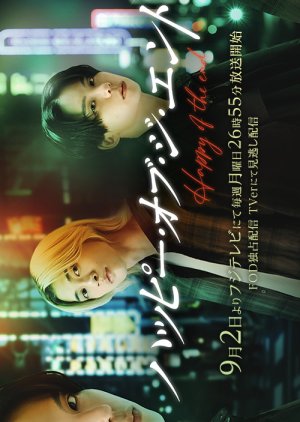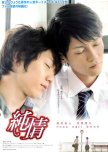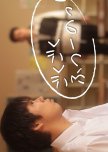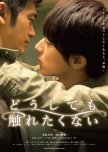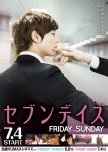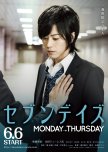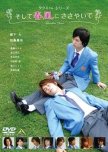
This review may contain spoilers
dark, disturbing, disgusting, but beautiful
Such a story makes speechless. It's a story of two man who suffered a lot, especially one character has a deep trauma because he was sold as a child to a sick man who sold him out to other sick people who sexually abused him. It's a story of two people changing each other and heal each other, first in baby steps but later their bond grows strong.I can't describe what feelings go through you when watching this, It's the whole bandwidth from disturbing, disgusting, aghast, angst to beautiful when you see both getting closer together. Due to the theme it's not a fluffy, funny show, you normally expect a BL to be. This is not really a BL but a drama where two man happend to be gay and finaly love each other.
When you can stormach such heavy stuff, this is a must see. If you are too sensitive seeing abusive scenes, you may watch with friends and help each other process the episodes one by one, If you are suffering from depression or other mental problems, you should not watch it at all. It was extremly brave for the team to take on such heavy non mass compatible material. The actors did an incredible job, cinematography is top notch and we get an intro which does not spoil the whole series which is so common in many series. My respect goes out to all involved in this project delivering such a unique show.
Was this review helpful to you?

"Happy of the End" : Toxic Bonds and Healing Journeys!
The heart of 'Happy of the End' is the turbulent life of the characters with a raw and poignant exploration of love, trauma and healing. It captures both the passionate life and shadowy corners where pain and beauty coexist.The series beautifully explores past trauma with their present struggles.
Chihiro is a man grappling with the aftermath of rejection both from his family because of his sexuality and haunted by the break up of his ex-boyfriend. His encounter with Keito, a charming yet very troubled figure marks the beginning of a relationship based on shared sufferings.
Chihiro is lonely and longing for home while Keito's backstory is a harrowing tale of abandonment and survival.
Somehow both of them became each other's refuge and mirror despite the chaos and trauma they were subjected to. Both the characters's journeys were heartbreaking but seeing them receive affection from each other was heartwarming.
The flashback scenes were powerful adding the layer as to why the characters are as they are. I liked the seamless transition plus the clear contrast between present and past. You can feel and know that both the lead characters need serious therapy but you still keep watching it for the rawness and athenticity.
Kaji was another character that I liked. Throughout he was such a good friend to first Kieto and then to Chihiro. The unconditional friendship and found family. <3
The series deals with serious themes like homophobia, child abuse, prostitution and animal abuse (Please read trigger warnings before starting this) faced by those living on the margins of society, it also speaks loudly about acceptance and capacity of love to heal even from the deepest wounds. This was dark and toxic but at the same time hopeful and happy. I know it doesn't make sense but at the end of it, it was actually 'happy of the end'.
However, it does feel rushed at times but that is due to the short run time. Maybe 2 more episodes would have justified the ending better and might have done better justice to this Art.
Overall, recommended if you're okay with dark themes, but please consider the trigger warnings. Again, be sure to read the TW before starting. It’s not all shining stars, but you can see the light throughout!
8.8/10
Was this review helpful to you?

how another person can change self-perception
Overall: this is a grittier story, but there is still hope. The series was based on a manga which I have read part of, however I tried to review the series on its own merits. 8 episodes about 25 minutes each. Aired on GagaOOLala https://www.gagaoolala.com/en/videos/4708/happy-of-the-end-2024Content Warnings: almost every single content warning, it has very serious themes (episode 4 was pretty brutal, could skip to 21:30, also the first half of episode 6 was difficult for me to watch)
What I Liked
- a grittier story we rarely see
- flawed characters
- the cooking subverted trope
- acted like grown adults who went thru some terrible things
- caring moments
- that a character didn't believe what another character told him in ep 7
Room For Improvement
- not a fan of exposition dumps but I realized they were trying to cover a lot in not much screentime
- were there no brakes on the truck in episode 5?
- in episode 7 a character was pretty stupid to rile up another character
- seemed pretty nonsense that a character was walking free after there was video evidence, also I don't think victims need to press charges, I think law enforcement can proceed with charges themselves
- one character had not enough consequences (and the lame last minute attempt at trying to make that character sympathetic), and then another character had too many consequences
- I'm not a fan of episode 8 overall, it didn't seem to fit the characters
Was this review helpful to you?

A little Ray of Light Got Through
This is not for the weak of heart. This will shatter you. This series is a beautiful porcelain teapot with millions of cracks in it. It has lost its shine and now its disgusting, seeming almost worthless. Whatever it lets out is dark, vile, broken, hard to stomach and hurts to comprehend. But every once in a while, a little ray of sunshine manages to get through the cracks, and although what comes out is a mess, chaotic, dysfunctional and unhealthy, it's also bright, happy, full of life, hopes, dreams, and above all else, it's beautiful. It's a beautiful mess that comes with facing a storm and coming out a winner. The rainbow after the storm,This drama made me cry. Made me question the love of a parent and humanity. I'm not going to write a long review, cuz I am sure everyone felt how I did when I watched this, so no more words are needed. We all know, Haoren and Chihiro's story would stay with us for a long time.
Applauds to everyone who worked on this one, they all did well bringing this to life in a way that touched the viewers.
Was this review helpful to you?

This review may contain spoilers
Happy in the End?
This is a conversation between me and my friend, Taeko. It is in two parts, the first covering Ep. 1 to 6, and the second covering Ep. 7 & 8, plus the series as a whole. As you will see, the division has proved quite useful, as the two parts really represent two different series, with what seem like two different sets of writers and directors.PART ONE. (Ep. 1 to 6)
ME: Kimi to futari, hanauta majiri, kasanaru tabi, iro asakaya, kimi ga suki datta....
TAEKO: For god's sake, are you still singing that song?
ME: Yes. What's more, I wrote down the lyrics, decoded the Kanji, translated it, and memorised the lines.
MY HUSBAND (from the kitchen): Neeeeeeeeeerd....
TAEKO: So, Happy of the End. I feel we aren't going to disagree much on this one.
ME: No! I don't know how the last two episodes will turn out, but so far, it might be one of the best of the BLs I have ever seen.
TAEKO: Praise indeed! I am surprised at how much they were able to pack into just 6 episodes so far... Even though I feel some things have been lost in the process.
ME: Like what?
TAEKO: Chihiro, for instance... His abandonment by his whole family deserves more attention, and more justice than the show has given it. It was limited to just a few scenes, and needed far more emotional heft than that. On the other hand, you might be able to better relate to his being in love with a bisexual man than I can. Did the show come too close to suggesting, though, that bisexuals are just greedy and sleep around?
ME: No, I just think Shun'ichi is an arsehole, and deserves to be lonely forever.
TAEKO (laughing): I love it when you become catty. But Haoren's storyline -- it is very well done.
ME: Right? He might have the worst life it is possible to have in Japan. And just when you think that the show couldn't possibly go *there*, it goes there. I can't think of a taboo it hasn't touched... except, maybe, incest.
TAEKO: You never know. I'm still not sure if the guy who drops his trousers was his dad, his step-dad, or someone else.
ME: Speaking of bad daddies, or baddies... Maya!
TAEKO: Asari Yosuke is an amazing actor. As soon as he appeared on the screen, my hairs stood on end. That frog scene... Ewww.
ME: As is Kubota Yuki. Kaji is a fascinating character, because, unlike most other characters, his moral compass is not easily decipherable. He doesn't have the clarity that even Haoren has. He sends Haoren to Maya, and says something homophobic to Chihiro. He later repents of both, but it is not clear he might not do it all again. The writing could have been better in that scene, but I didn't think a BL was even capable of such subtle characterisations. Then there is also Yamanaka So as Matsuki -- another strange character. The simultaneous admixture of care and predation, of abuse and regret. His facial expressions were just superb. He convinced me in one minute why someone would *want* to be his pet.
TAEKO: But are we happy with the main actors?
ME: Beppu Yarai is a revelation for me. His eyes dance, his lips seduce, his body invites pity and sorrow. I'm less sure of Sawamura Rei.
TAEKO: I disagree. Rei was a revelation for me. You expect the hardened victim of child abuse and trauma to be this mere carapace of a human being, incapable of a smile, and incapable of hope. Haoren even declares himself to be so. But his actions belie his thought, and Rei captured that very well. And he's not this big, burly, intimidating, "blokey" bloke. His littleness and fragility are precisely what feel are subversive. Plus, you know how I love tiny tops.
ME: You're weird, you are. I still think Rei has been miscast, and, apart from Semantic Error, cannot think of the last time when an idol was good. But what about the show itself? Any reservations?
TAEKO: I found the frequent flashbacks tiresome. Especially when it was repeating the same scenes of abuse. In a short series, every second is precious. I also thought the slaps and the hitting weren't convincing. They needed better stunt coordinators. What about you? Didn't the inner monologues bother you?
ME: I could have done without them. It's a compulsive need the Japanese seem to have to rely more on the manga than on the script or the actors. But I do think that the decision to retain the basic structure of manga/BL storytelling, while trying to fit such an unusual story within it, might have been deliberate.
TAEKO: How so?
ME: Because it is jarring. The whole framework is jarring. The grammar of BL/Manga sets certain expectations for you, and their fossilised vocabularies then provoke predictable reactions to predictable events. Here, however, the grammar is there, but not the vocabulary. So, I don't necessarily feel the way I'm supposed to feel.
TAEKO: That *is* true, actually. I thought the portrayal of abuse was almost cold, clinical. And I didn't necessarily feel I needed to cry or be sad. It made me numb, which is perhaps how Haoren felt. Plus, there was no loud music to tell me how I ought to feel throughout the show.
ME: Can we talk about the music, and how good it is?
TAEKO: You're not going to start singing again, are you?
ME: No, I mean the background music. It wasn't particularly original -- there were those sustained guitar chords for the romance, and the xylophone ripples for Maya -- but it was atmospheric, and at least felt assonant with the plot.
TAEKO: You seem to like the show so much more than I do. Which is surprising. Because if anyone is a cynical arsehole between the two of us, it's you.
ME: Why, thank you. I will admit, I was quite miffed about the sex scenes.
TAEKO: Thank god! Me too. Are white blankets the new pixellation now? What was that?
ME: I agree! The loveless sex scenes were bad enough. But, when they finally make love after Haoren has disclosed his wounds -- and after we have seen a glimpse of both men's curves -- it seemed an act of criminal negligence to just throw a blanket over them. This is where they finally accept each other, their bodies, their love.
TAEKO: What made it worse for me was: after all that boldness on the streets, why the shyness between the sheets? Especially after the fleshlight scene, which was just... heartbreaking. If you can dwell long enough, and graphically enough, on scenes of abuse and violence, you can dwell enough on love. Urgh... Japan.
ME: Not limited to Japan, though, is it? In America, Red, White & Royal Blue, an innocent little gay flick, has the same rating as Django Unchained. Violence is preferable to intimacy, it seems, and straight intimacy to intimacy between men.
TAEKO: Let's not go there. But I'm happy you are so enthusiastic about a show for the first time in ages! I am less enthralled than you, but agree that this is a brilliant show.
ME: I agree. 2024 has been a dud so far. Let's hope this one picks up the slack...
MY HUSBAND (setting the table): Nerds...
PART TWO. (Ep. 7 & 8)
ME (to my husband): Take the rubbish out, will you?
TAEKO: You sound sad, my love.
ME: I am.
TAEKO: Why?
ME: That the series is over. That it made me cry a few times in the last episode. But, above all, that what I feared most still came true: a *precipitous* decline in quality in the last two episodes.
TAEKO: I hate to say this: but I did... Never mind, go on.
ME: Well, let me think: the last episode alone had the noble idiot trope, a forced separation at the train station, the nonsensical suicide of Maya -- which was completely at odds with his characterisation throughout the series -- the brief coming together of all the characters just before the ending... I mean, is that all you have to show of Kaji and Matsuki, two of the best characters in the show? The degree to which it borrowed from the BL trope kit was almost embarrassing.
TAEKO: Yet there were moments that moved you in it?
ME: Yes. Chihiro's face on the train when he realised that Haoren wasn't going to contact him. (Beppu is the saving grace of that episode, despite the director's best efforts to ruin him.) The moment where Haoren finds him on Instagram. The recognition of his own photo at the exhibition (though it was definitely not the photo Chihiro took). The brief cut, in the last scene, where they break the fourth wall (though the direction of it was really, truly awful). What did you think?
TAEKO: It all felt to me terribly rushed. I could barely keep up with all the stabbing and the running and the seaside gallivanting and the running away again and the prison time... It was exhausting. The seals were cute though. And with such logical inconsistencies as Chihiro's sudden success where he had none before (couldn't he have worked and saved up for a camera earlier?), and a mere three-year sentence for attempted murder, my disbelief could no longer be suspended. I'm also afraid I wasn't quite as moved as you with those precious moments, nor as disappointed with others, because my expectations were far lower.
ME: Maybe I just didn't want the final episode to be a complete failure.
TAEKO: What about the penultimate episode? Did you find it just as wanting?
ME: Well, it certainly wasn't memorable. I was really terrified going in -- which is a good thing -- because I knew Maya was gunning for Chihiro, but then it all became deflated like a tyre on road pike, didn't it?
TAEKO: Oh god yes. I watched the stabbing scene with almost Buddhist serenity, though this might be because they spoiled it for us in the trailer, as they did the train scene. The whole interlude between the assault and the stabbing was so odd, and so unconvincingly domestic -- and then, Haoren even used the "it's all my fault" line. Did Nicholas Sparks write this part?
ME: I wish it weren't so, but you're right.
TAEKO: So, no longer among the best of the BLs?
ME: No, no. It did make me cry at the end, which few BLs do. But I don't know why. If I could split it into two series, the first six would get a 9, and the last two would get a 6, which averages out to 7.5. But that still feels a bit generous.
TAEKO: Especially from you, for whom a single scene can sound the death-knell of a series.
ME: Hahaha. True. But I don't think the final episodes of HOTE were done in bad faith -- which is what pissed me off about the final scene of Cherry Magic, for example. So I'm willing to give it more of a pass. How about you?
TAEKO: I'm going to give it a 6 at best, but then, you know I'm a heartless bitch.
ME: Language!
TAEKO: Sorry.
ME: You know what makes me most sad, Taeko? Something told me this was exactly what was going to happen. I feel as if I knew it all along, not least because this is what happens whenever they squeeze a long manga into a short series. It always runs out of steam. Urgh. I hate being right.
TAEKO: You are the modern Cassandra, the entangler of men. Now, we need a good laugh. Shall we hate-watch something together?
ME: As it happens, I have just the thing...
Reader's Digest:
DO SAY: I'm addicted to you...
DON'T SAY: Don't you know that you're toxic?
Was this review helpful to you?

This review may contain spoilers
Different Kind of Happy
Very rare a series can pull off both stark grittiness and tender love as this did. This is not about a romantic tender love but of two people meeting at the worst times in their lives, needing what only the other could give and held on.Chihiro stuck in a cycle of exchanging sex for being taken care of by whomever, all in the name of 'love'. He couldn't get past the betrayal he endured when his secret lover dumped him and got married. Aimless and jobless he sleeps around, not caring what tomorrow brought. Until he met Keito.
Keito, abandoned, abused and mutilated, mired in the sex trade by Maya, a drug addicted sex peddler. Maya keeps undocumented and forgotten youths hostage with the threat of violence due to his erratic behaviour. Keito, broken by his circumstances, doesn't have a desire to escape, until he overhears Maya agreeing with a customer that Keito can be killed if they wish. Here, the spark for life is ignited and runs away. Hired to retrieve stolen items, he meets Chihiro.
Their meeting is as voilent as their surroundings, but something attracts Chihiro to Keito and he is unwilling to let go. Keito is cold and blunt. Chihiro is still a bit niaive but completely open and honest. Somehow, they fit. Through unorthodox methods, Keito saves Chihiro by showing him how much he is worth. Chihiro, over numerous events, reciprocates the love through his loyalty and care.
The stark brutality is ever present and not for everyone. The scenes are graphic and Maya's offensiveness can be off putting. The series is still very beautiful for it's points of views and the telling of it. The actors did a brilliant job and truly embodied their roles. Even to the point of evoking sentiment where needed. The production was perfect with the depiction of the cold sordid environment to contrast their love as it blooms. Against all odds, love can grow even here.
Definitely worth the watch. Japan didn't disappoint.
Was this review helpful to you?

MASTERPIECE!
This is one of the saddest and darkest bl I've ever watched and I think I never wanted the two main characters to be happy this much before.... Normally most of the bl characters are just characters to me and most of the time I don't even bond with them but I just wanted Haoren and Chihiro to be happy in this series... I cried in multiple episodes, everyone portrayed their characters so well (I know every Japanese bl has good acting in it but this series is another level..)And you think Chihiro has a sad backstory and then Haoren's backstory just slaps you in the face in episode 4.. I never felt so disturbed and sad in any bl before I swear..
I don't know what else to say but watch this series if you are strong enough..
Was this review helpful to you?

This review may contain spoilers
Dark, disturbing, realistic, and brilliant
First of all – this is not a BL series. It is a gay series that takes the viewer to the dark side of society, and in my opinion it's been the best LGBT series of 2024 so far.There should be trigger warnings of violence, male and female forced prostitution of minors, torture, murder, and suicide. Doesn't sound exactly heartwarming, does it? But then there are some glimpses of happiness in all this mess, which are the more touching because of the extreme contrast to the overall situation.
The series tells the story of two young men living on the fringe of society. Chihiro (Beppu Yurai) was kicked out of and disowned by his rich family as an adolescent because of his sexual orientiation. As a young adult he tries to make ends meet with casual jobs and and prostitution. Keito/Haoren (Sawamura Rei), who experienced child abuse by his mother's partner, was abandoned by his mother at very young age. Kaji (Kubota Yuki), who later becomes Keito's closest friend, takes him to work for Maya (Asari Yosuke), a BDSM pimp whose clients are men and women who find pleasure in torturing, or even killing, kids.
The two young men meet in a bar, where Chihiro approaches Keito, who he thinks is wealthy, with the intention of fleecing him. When they get to a hotel, Keito unexpectedly beats Chihiro up as Chihiro has stolen cards from Keito's employer. When Chihiro wakes up in a pile of rubbish, Keito ”kidnaps” him and makes him help move apartment.
Keito is on the run from his former ”employer”, because after almost being killed by a client he had reported him to police, and in the eyes of the pimp was thus responsible for his 5-year sentence. This is why Keito moves house frequently, but Maya finds him once again, leaving a camera with photos of frogs as a warning near Keito's doorstep. On top of all the disturbing scenes of child abuse, Maya's malice is illustrated in a scene where he kills a frog by squeezing if to death with one hand.
As Chihiro has no place to go, he moves in with Keito, and the two young men get closer physically and emotionally. When Keito's mother, a prostitute who has lost her memory, commits suicide, Chihiro helps him overcome his deep depression.
Then Maya kidnaps Chihiro, humiliates and injures him badly. Keito takes revenge by stabbing Maya. After this, Chihiro and Keito's escape to a seaside resort to start a new life. They relive some of Chihiro's happy childhood memories, but Keito decides to turn himself in to police and is sentenced to 5 years. Maya finally commits suicide. While Keito is in prison, Chihiro manages to make a career as a photographer.
I won't spoil the ending here – only so much: as the title indicates, it isn't a sad one.
The plot of this series is sad, disturbing, dark, and more often than not ugly, but as I mentioned there are moments of happiness the two young men find despite all the evil things that have happened and are happening in their lives. The script is realistic to the point of pain for the viewer, and it depicts the protagonists' respective backgrounds in flashbacks skilfully woven into the main plot.
The setting adds to the gloomy atmosphere of the story – from Maya's run down apartment where he imprisons girls and boys, to a street of cheap prostitutes and – most of all – the barely furnished apartments where Keito and Chihiro are hiding from Maya. Some shots – like Keito crouching all alone in an empty room – are in fact masterly done, and the cinematography and the coloring in general contribute a lot to the quality of this series. Director Furumaya Tomoyuki, like in the BL series ”Ameiro Paradox” which he also directed, manages to make his actors perform brilliantly.
There would have been two ways of casting the actors for this series. It could have been made with amateurs with a similar background as the characters for the best possible authenticity, and it could have and was made with amazing actors who portray their characters absolutely convincingly. This is not only true with respect to the brilliant Beppu Yurai and Sawamura Rei, who are both able to display their characters' feelings naturally using body language and changes of expression. Kubota Yuki plays the ”elder brother” with exactly the right blend of warmth and strictness, and Asari Yosuke manages to make the viewer hate his character Maya from the bottom of their hearts.
The soundtrack is a pleasure as it sensitively matches the action – there are scenes without any music, especially when Chihiro and Keito have conversations important to the story.
To sum up – this series is near perfection in every aspect - storytelling, directing, editing, and acting. It is no series faint-hearted persons should watch before going to bed, and it does clearly not address the average underage BL fan. But everybody who is intersted in realistic LGBTQ+ series that do not hide the dark side of life may enjoy watching it, although it really hurts sometimes.
In my opinion, this is the best LGBT series of 2024 so far. Highly recommended !
You find all my BL reviews, incl. those about series and movies from countries not covered by MDL, such as Vietnam, Cambodia, Myanmar, and Singapore here: https://www.wattpad.com/myworks/303301998-reviews-of-asian-bl-series
Was this review helpful to you?

Not a show to be missed
The show potrays such raw emotions.The story is not fluff and is dark. The relationship of protagonists starts off as toxic that eventually gets better. I loved the interaction between male leads.Both the protagonists are broken people.What I liked-
•Direction and cinematography
•Acting of leads as well as supporting characters.Maya's acting made me want to kill him😅
•I fell in love with background music.
The speed of storytelling was on spot and show was not dragged unnecessarily.
I do not feel any shortcomings that could be mentioned.
Was this review helpful to you?

This review may contain spoilers
Gritty, Grimy & Unglamorous Tokyo
Ogeretsu Tanaka is one of the most unique mangaka in the genre. Her beautiful artwork and storytelling just forces the reader to deeply empathize with her characters.The actors were A+++ in this series. I don't know if it is from smoking and drinking, but unlike Japanese women, younger Japanese men often look older than their age. Both Sawamura and Beppu look older than men in their 20's. The cinematography allows their skin texture and fine lines to show, and I love that. Maybe that was to show how tough their lives have been. Both men are very handsome, but I'm just used to viewing actors filmed through filters, showing flawless skin.
What is beautiful about this series is, the ugliness that we see on the screen and the two men who fall in love in the middle of the chaos. We get to see what Japan tries to hide as a country, child abuse, sex work, CSA, child sex work, insanity and suicidal ideation. I'm not saying the country is 90% horrible, but visitors like the shounen anime, manga, Tokyo Disneyland Japan with a few temples and shrines thrown in. While people are feeding their consumerism, there is a parallel world going on.
Critique: What I did not really like was the heavy focus on child and adult abuse, replaying those scenes over and over at the expense of some very tender and thought provoking conversations between the two leads in the manga. I'm not going to spoil the manga, but the fried chicken scene in the manga had more humor and was very cute. The series did not really mention the type of work performed by Haoran. One of my biggest pet peeves was, that Haoran did not have a buzz cut when released from prison. Japanese inmates have short hair. This is also a bothers me with military movies as well, so it will not detract from the series for people who do not care about that.
Overall, this was a great series. It is not that rewatchable for me, mainly because of the amount of child abuse and CSA scenes, some of which are replayed. Highly recommend to watch it at least once.
Was this review helpful to you?

This review may contain spoilers
Disturbingly beautiful
This is definitely not your usual pure and fluffy BL. It contains many dark themes and explores different views of life and the reality of it.The story itself has a heavy atmosphere. Two guys searching for the meaning of life and something or someone they can call home. There are a lot of heavy themes discussed so TW for those who are sensitive to these kind of things (suicidal characters, rape, abuse, violence, etc.).
The main leads complement each other perfectly. Both of them are very well written. The two of them have a very disturbing and traumatic past yet it was so well portrayed. It managed to capture the harsh reality of life. The actors did a decent job playing them and portraying their emotions.
Overall, this was a huge rollercoaster of emotions for me. It was both disgusting, disturbing and dark yet so well written that I couldn't stop watching. I am glad that I gave this a try even tho I was hesitant to watch it at first. Definitely worth the watch.
Was this review helpful to you?

Raw, brutal, horrific and proof that beauty can be found in the darkest place
This drama is far from your regular BL and will take you on a brutal journey as the characters are evolving in the darkest side of the night life of Shinjuku. The story is very heavy and gritty in addition to be totally immersive: once you start, it is both very complicated to continue because of the violence but at the same time as difficult to stop watching. There are a lot of exploration in the psyche of the characters and I was deeply invested in the storytelling. It was in overall well paced, I only wish there had been a bit more time to wrap up the ending.The acting was overall very good: I found it pretty balanced between the two male leads and there were no obvious weak link among the cast. Maybe the way that some of the heavier material was played could have been improved but I found it was mostly a convincing emotional portraying.
There is an inherent indie feeling to the production that I enjoyed a lot. The various locations were very interesting and well-filmed: wether it is the Shinjuku night life as well as the other places the characters are going to. I enjoyed as well the opening song, very fitting for the series.
I would recommend this drama to people that are looking for a dark story. Be mindful of the triggers, there are a lot of abuse, violence. It is a super impactful story, not necessarily that rewatchable to me because of how gut-wrenching it is. You need to be strong to go through the horror but at the same time the moments of beauty and love that can be found are worth the brutal journey.
Was this review helpful to you?

